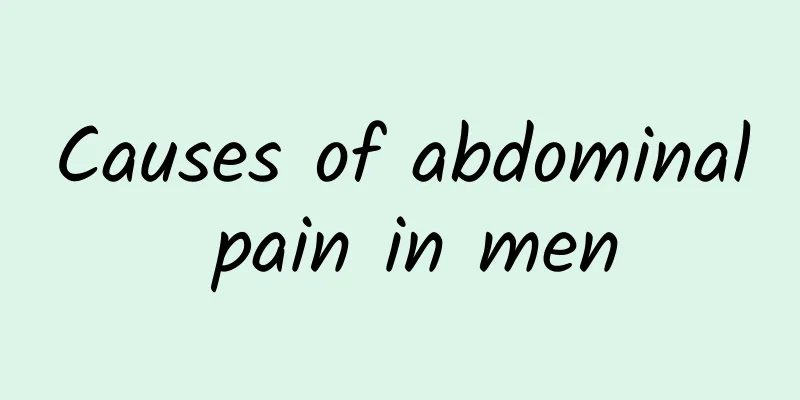Causes of abdominal pain in men

|
Lower abdominal pain in men is also a common disease. There are many reasons for this pain. It may be caused by multiple diseases. So if you want to know why boys have lower abdominal pain, you must first determine what causes which disease, which leads to the symptom of lower abdominal pain. Abdominal pain refers to pain from below the ribs to above the groin. Abdominal pain may be caused by gastrointestinal diseases such as liver, gallbladder, pancreas, gynecological diseases or urogenital problems. Mild abdominal pain is mostly caused by minor gastrointestinal problems such as indigestion. Persistent severe abdominal pain without diarrhea may be a very serious disease. Abdominal pain with vomiting, abdominal pain that does not subside after vomiting, soft and bloated abdomen, or patient drowsiness and confusion, may be due to the following very serious diseases: ① Gastrointestinal diseases: gastric ulcer, cancer, appendicitis, intestinal obstruction, intestinal perforation, intussusception, acute intestinal ulcer, local enteritis, etc. ② Diseases of the urinary and reproductive systems: renal colic caused by kidney stones or cancer, pyelonephritis, prostatitis, and cystitis. ③ Various gynecological diseases: ectopic pregnancy rupture, ovarian cyst pedicle torsion. ④ Liver and gallbladder diseases: cholecystitis, hepatitis, cholelithiasis. ⑤ Peritonitis caused by different reasons. ⑥Thrombotic diseases. For the patient's safety, see a doctor or go to the hospital emergency room immediately. Never take aspirin or other narcotic painkillers for abdominal pain. Aspirin is harmful to abdominal pain, and narcotic painkillers can mask symptoms and interfere with diagnosis. 1. Symptoms: Abdominal pain below the waist (navel), burning sensation when urinating, and increased urination frequency. Possible cause: cystitis. Treatment: Antibiotics are required. However, the doctor will also use pyelography to investigate the cause of inflammation and then treat the symptoms. 2. Symptoms: Abdominal pain lasts for more than 1 hour. Possible causes: There are many reasons for abdominal pain, and it needs to be diagnosed by a specialist. Regardless of whether there are other symptoms, you should see a doctor immediately. Treatment: Do not eat before seeing a doctor. If the doctor cannot see what is wrong, the patient will have to stay in the hospital and can only be treated after the problem is found out. Persistent abdominal pain without diarrhea is likely to be a very serious disease. 3. Symptoms: Abdominal pain lasts for more than 1 hour, with vomiting at the same time. The abdominal pain does not subside after vomiting, and the abdomen is swollen. Severe patients may be drowsy or unconscious. Possible: It is a very serious symptom. Treatment: Do not eat before seeing a doctor. Go to the hospital immediately. If the doctor cannot diagnose the disease, he may have to use laparotomy, which is to open the patient's abdomen for direct inspection. Only after finding out what the disease is can the disease be treated. 4. Symptoms: Abdominal pain lasts for more than 1 hour, diarrhea. Possible: Abdominal pain and diarrhea are mostly caused by eating unclean food (food poisoning), causing gastrointestinal inflammation. Treatment: Pay attention to the following points when the symptoms have not disappeared. ① Do not eat solid food and do not drink milk. ②Drink at least 1 liter of boiled water (without sugar) every day. ③If you have diarrhea too often, drink salt water (add half a teaspoon of salt to 1 liter of water) to replenish the water lost due to diarrhea. ④If you find red or colorless mucus in your stool, you should see a doctor. 5. Symptoms: Abdominal pain starts from the waist and then moves obliquely downward to the groin. Possible: ureteral problems, kidney inflammation or stones. Treatment: Go to the doctor and have a urine test. ① Inflammation, treat with antibiotics. The patient should drink plenty of water ② Stones, the doctor may have to do a pyelogram for the patient to check for stones. Depending on the nature of the stones, the patient should drink plenty of water. You can try to dissolve it with medicine. Some people have taken allopurinol (a gout medicine) and potassium salt, and have achieved very good results, but further confirmation is needed. There are also satisfactory results of using ultrasound to break up stones. When it is necessary, only surgery can be performed. To prevent the regeneration of stones, patients should eat low-calcium and low-purine foods. 6. Symptoms: Sudden lower abdominal pain in women of childbearing age, with a history of amenorrhea, accompanied by irregular vaginal bleeding, syncope or shock. Possible cause: ruptured ectopic pregnancy. Treatment: Send to hospital immediately. If posterior fornix puncture is performed during gynecological examination, bloody fluid can be drawn out. The doctor will need to perform emergency surgery. 7. Symptoms: Pain on the right side of the waist below the ribs. Possible cause: gallstones. Pain, nausea, and vomiting about two hours after eating. Treatment: Go to the doctor, who may use ultrasound scans for diagnosis. If the patient is in too much pain, the doctor may give the patient an injection of painkillers. Patients should pay attention to the following points. ① Eat less fatty foods. ② Take some muscle relaxants. ③ Take some painkillers, such as acetaminophen, when necessary. ④ Take medicine to help dissolve gallstones. ⑤ If the above treatments are ineffective, surgery is required to remove the gallbladder. 8. Symptoms: Abdominal pain in the upper part of the abdomen, below the chest. Possible cause: indigestion. Treatment: Go to the pharmacy and buy some digestive medicine. Do not eat too much at each meal. If the symptoms occur frequently and become more severe, see a doctor. 9. Symptoms: Abdominal pain lasting more than 3 hours, first around the navel, with or without vomiting. When you touch the midpoint of the straight line from the hip to the navel (the coccyx), it hurts a lot. Possible: appendicitis. Acute appendicitis may also cause fever. Treatment: Go to the doctor. The doctor will treat with antibiotics and, if necessary, surgery. The above introduces many possible causes of lower abdominal pain in men. Everyone should make a preliminary judgment based on their own specific situation. Of course, it is best to go to a regular hospital for a detailed examination, so that you can be truly assured. Sometimes the pain may be caused only by poor rest or other minor reasons, so there is no need to be too nervous. |
<<: Causes of Hernia in Little Boys
>>: Causes of prostate bleeding
Recommend
How to improve male sexual ability
For men who are busy at work, especially those wh...
My penis is swollen, what's going on?
Many men find a lump on their penis in their dail...
Tips for cleaning vaginal discharge
The male reproductive system is not as complicate...
Is Daknin effective in treating glans inflammation?
Penis inflammation is mostly caused by bacterial ...
The cause of pimples on the eggs
I believe everyone is familiar with the symptom o...
Genital elongation
Many men have suffered from unhappy sex lives due...
How to treat prostate pain
Prostate pain is a problem that many men have. Th...
What is the problem of adhesion between foreskin and coronal sulcus?
Foreskin and coronal sulcus adhesion is a disease...
What are the methods of traditional Chinese medicine for treating impotence and premature ejaculation?
If male patients have frequent sexual intercourse...
What are the methods of abdominal weight loss exercise for men?
Speaking of weight loss, I believe many girls adm...
Why do you feel tired at work? What are the common reasons for feeling tired at work?
Most people have complained about how tiring and ...
What happens if there are fat particles on the foreskin?
Men's reproductive health is very important. ...
Treatment methods for cryptorchidism, commonly hormones and surgery
The testicles are an important part of the male r...
What is the effect of drinking alcohol on prostatitis?
Nowadays, many people have the habit of drinking....
How much do you know about renal insufficiency and hyperkalemia?
Many diseases can cause electrolyte disorders, an...









